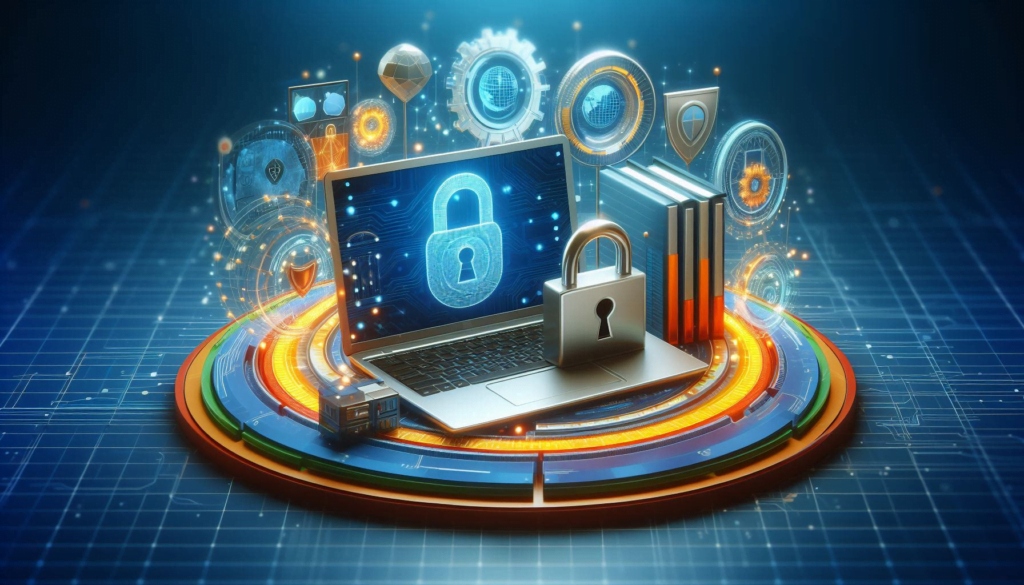Technology Moment, Unveiling the World of Cyber Security Specialists. In today’s digital age, where our lives are increasingly intertwined with technology, the role of a Cyber Security Specialist has never been more crucial. As cyber threats become more sophisticated and pervasive, these professionals stand as the first line of defense, safeguarding sensitive data and ensuring the security of our virtual world.
Imagine the cyber realm as a bustling city, with data flowing like traffic through an intricate network of roads. Just as a city needs vigilant traffic controllers to prevent accidents and keep things running smoothly, our digital landscape relies on Cyber Security Specialists to monitor, protect, and fortify against potential dangers. From thwarting malicious attacks to fortifying defenses, their work is both challenging and vital.
In this blog, we’ll delve into the dynamic role of a Cyber Security Specialist, exploring their responsibilities, the skills required, and the impact they have on our interconnected world. Whether you’re considering a career in this field or simply curious about the unsung heroes of cyber defense, join us as we navigate the essential aspects of this pivotal profession.
What is a Cyber Security Specialist?
A Cyber Security Specialist is a professional responsible for protecting an organization’s information systems and networks from cyber threats. These specialists play a crucial role in safeguarding sensitive data from unauthorized access, ensuring that digital environments remain secure. They implement security measures, monitor systems for vulnerabilities, and respond to potential breaches. In essence, a Cyber Security Specialist acts as a digital guardian, ensuring the confidentiality, integrity, and availability of information within an organization.
The Growing Importance of Cyber Security
In today’s digital age, almost every aspect of our lives involves some form of technology, whether it’s personal data stored in the cloud, financial transactions online, or corporate information systems. This reliance on technology makes cybersecurity more critical than ever. Cyber threats, including hacking, phishing, ransomware, and data breaches, are constantly evolving, making the need for skilled professionals to combat these threats more pressing. The growing importance of cybersecurity is evident across all industries, from healthcare and finance to government and retail. As cyber threats become more sophisticated, the demand for Cyber Security Specialists continues to rise, making it a highly sought-after profession.
Reasons to Think About Pursuing a Career in Cybersecurity
If you’re looking for a career with a significant impact, endless opportunities, and the potential for growth, becoming a Cyber Security Specialist might be the perfect choice. The field offers a dynamic and challenging work environment where you can make a real difference by protecting critical infrastructure and sensitive information. Additionally, the cybersecurity field is known for its competitive salaries and job security, given the increasing demand for professionals. Whether you’re just starting your career or looking to make a change, the field of cybersecurity provides ample opportunities for advancement, continuous learning, and personal fulfillment.
Table of Contents
What Does a Cyber Security Specialist Do?
A Cyber Security Specialist plays a crucial role in protecting an organization’s digital assets from cyber threats. Their primary responsibility is to ensure that the company’s information systems are secure from unauthorized access, breaches, and other cyberattacks. Let’s dive into the key aspects of their role:
Daily Responsibilities and Tasks
Cyber Security Specialists are involved in a variety of tasks that revolve around safeguarding data and systems. These include:
- Monitoring Security Systems: They continuously monitor the organization’s networks and systems to detect suspicious activities or potential threats. This often involves using specialized software to track and analyze traffic, looking for signs of breaches or vulnerabilities.
- Incident Response: When a security breach or cyberattack occurs, the specialist is responsible for responding swiftly to minimize damage. This might involve isolating affected systems, analyzing the breach, and implementing measures to prevent further incidents.
- Conducting Security Audits: Regular audits are performed to assess the effectiveness of current security measures. This includes checking for compliance with industry standards, identifying potential weak spots, and recommending improvements.
- Implementing Security Measures: Specialists are tasked with setting up firewalls, encryption, and other security protocols to protect sensitive information. They also ensure that these measures are up-to-date and effective against the latest threats.
- User Training and Education: Educating employees about best practices in cybersecurity is an essential part of the job. This includes training on recognizing phishing emails, using strong passwords, and understanding the importance of data privacy.
Key Skills Required for the Role
To excel as a Cyber Security Specialist, one needs a combination of technical expertise and soft skills. Here are some of the key skills required:
- Technical Proficiency: A strong understanding of networking, operating systems, and security protocols is essential. Familiarity with tools like intrusion detection systems (IDS), firewalls, and encryption software is also important.
- Analytical Thinking: Specialists need to analyze complex data and situations to identify potential threats and vulnerabilities. This requires a keen eye for detail and the ability to think critically under pressure.
- Problem-Solving Abilities: When a security issue arises, quick and effective problem-solving is crucial. Specialists must be able to devise solutions that not only address the immediate threat but also prevent future occurrences.
- Communication Skills: Explaining complex security concepts to non-technical staff is a common task. Strong communication skills are necessary to ensure that everyone in the organization understands their role in maintaining security.
Common Tools and Software Used
Cyber Security Specialists rely on various tools and software to carry out their duties effectively.
- Security Information and Event Management (SIEM) Tools: These systems collect and analyze data from various sources within the network, helping specialists detect and respond to threats in real-time.
- Intrusion Detection Systems (IDS) and Intrusion Prevention Systems (IPS): IDS/IPS tools monitor network traffic for unusual activities that might indicate a security breach. IDS detects and logs potential threats, while IPS takes proactive steps to block them.
- Encryption Software: To protect sensitive data, encryption tools are used to encode information, making it inaccessible to unauthorized users.
- Firewall Solutions: Firewalls act as a barrier between trusted internal networks and untrusted external networks, controlling incoming and outgoing traffic based on predetermined security rules.
- Vulnerability Assessment Tools: These tools scan systems and networks for vulnerabilities that could be exploited by attackers. They help in identifying weak points that need to be addressed.
Cyber Security Specialist vs. Cyber Security Analyst
Understanding the Differences
When diving into the world of cybersecurity, it’s easy to get confused by the various job titles. Two of the most commonly misunderstood roles are those of a Cyber Security Specialist and a Cyber Security Analyst. While both positions play crucial roles in protecting an organization’s digital assets, they focus on different aspects of cybersecurity.
- Cyber Security Specialist: This role is often more specialized and technical. A Cyber Security Specialist typically focuses on specific areas within cybersecurity, such as network security, incident response, or penetration testing. They are the go-to experts when it comes to deep technical issues, and they often have a narrow but deep knowledge base. Their work involves implementing and managing security measures, responding to security breaches, and ensuring that the organization’s systems are protected against various types of cyber threats.
- Cyber Security Analyst: On the other hand, a Cyber Security Analyst has a broader role, focusing on the overall security posture of the organization. Analysts are responsible for monitoring the organization’s networks for suspicious activity, conducting risk assessments, and analyzing data to identify potential vulnerabilities. They also work on developing and implementing security policies and may be involved in training staff on security best practices. Cyber Security Analysts take a more proactive approach to security, identifying potential threats before they become major issues.
Overlapping Responsibilities
While the two roles are distinct, there are areas where their responsibilities overlap. Both Cyber Security Specialists and Analysts are involved in protecting an organization’s data and systems. They both work with similar tools and technologies, such as firewalls, intrusion detection systems, and antivirus software. Additionally, in smaller organizations, these roles might be combined, with one person handling both the specialized and broader aspects of cybersecurity.
Which Role is Right for You?
Deciding between a career as a Cyber Security Specialist or a Cyber Security Analyst depends on your interests and strengths. If you enjoy diving deep into technical problems and becoming an expert in a specific area, the Cyber Security Specialist role might be a better fit. However, if you prefer a role that involves strategic thinking, monitoring, and a broader view of security, then a Cyber Security Analyst position might be more suitable.
Both roles are essential in the cybersecurity landscape, and the choice between them should be guided by your personal interests and career goals. Each path offers unique challenges and opportunities, making them both rewarding choices in the field of cybersecurity.
How to Become a Cyber Security Specialist
Embarking on a career as a Cyber Security Specialist requires a combination of education, certifications, experience, and continuous learning. Below is a step-by-step guide to help you navigate this career path.

Educational Requirements
While there isn’t a one-size-fits-all educational path, most Cyber Security Specialists start with a solid foundation in computer science, information technology, or a related field. A bachelor’s degree is typically the minimum requirement, though some may enter the field with an associate degree or relevant certifications if they have strong hands-on experience.
Key areas of study might include:
- Computer Science: Understanding the fundamentals of computing, algorithms, and programming.
- Information Security: Learning about network security, cryptography, risk management, and threat assessment.
- Ethical Hacking: Some programs offer courses that teach how to think like a hacker to better understand how to defend against attacks.
- Network Administration: Gaining knowledge about managing and securing networks, which is crucial for identifying vulnerabilities.
Essential Certifications
Certifications are crucial in the cyber security field, as they validate your knowledge and skills to potential employers.
- CompTIA Security+: A fundamental certification that covers essential principles for network security and risk management.
- Certified Information Systems Security Professional (CISSP): A globally recognized certification that demonstrates your ability to design, implement, and manage a best-in-class cybersecurity program.
- Certified Ethical Hacker (CEH): Focuses on understanding and using hacking techniques to find and fix security vulnerabilities.
- Certified Information Security Manager (CISM): For those looking to move into a management role within cybersecurity, focusing on managing and governing information security programs.
- Certified Information Systems Auditor (CISA): Ideal for those interested in auditing, control, and assurance.
Gaining Relevant Experience
Experience is vital in cyber security. Most employers prefer candidates with hands-on experience in the field.
- Internships: Look for internship opportunities during or after your studies. Practical experience is gained through internships, which frequently lead to full-time jobs.
- Jobs at Entry Level: Take a look at positions like junior security analyst, network administrator, or IT support. These positions allow you to build foundational skills in real-world settings.
- Volunteer Work: Consider offering your skills to non-profits or smaller organizations that may not have a large budget for cyber security.
Building a Portfolio
Include examples of projects, case studies, and any hands-on work you’ve done, such as:
- Security Audits: If you’ve conducted any security audits, highlight the scope, tools used, and the outcomes.
- Penetration Testing: Document your penetration testing efforts, showcasing your ability to identify and mitigate vulnerabilities.
- Incident Response: If you’ve been involved in incident response, describe the situation, your role, and the resolution.
- Certifications and Courses: Include your certifications and any additional courses you’ve taken to show your commitment to continuous learning.
Continuous Learning and Staying Updated
- Professional Development: Attend workshops, webinars, and conferences to stay informed about the latest trends and tools.
- Online Courses: Platforms like Coursera, Udemy, and LinkedIn Learning offer courses that cover the latest in cybersecurity.
- Join Cybersecurity Communities: Engaging with online forums, social media groups, and local meetups can help you network with other professionals and stay updated on industry developments.
Cyber Security Specialist Salary
How Much Does a Cyber Security Specialist Make?
The salary of a Cyber Security Specialist can vary significantly depending on several factors, including experience, location, education, and the specific industry they work in. On average, Cyber Security Specialists in the United States earn between $70,000 and $120,000 per year. However, seasoned professionals with advanced skills and certifications can command salaries well above $150,000 annually.
Factors Affecting Salary
- Experience Level: Entry-level Cyber Security Specialists might start on the lower end of the salary spectrum, while those with several years of experience, especially in specialized areas, can expect higher compensation.
- Education and Certifications: Holding a relevant degree, such as in Computer Science or Information Technology, can boost earning potential. Additionally, certifications like Certified Information Systems Security Professional (CISSP), Certified Ethical Hacker (CEH), and CompTIA Security+ can significantly impact salary, as they demonstrate a higher level of expertise and commitment to the field.
- Location: Geographic location is another crucial factor. Cyber Security Specialists in tech hubs like San Francisco, New York City, and Washington D.C. Conversely, salaries might be lower in regions where demand is not as intense.
- Industry: The industry in which a Cyber Security Specialist works also affects salary. For example, specialists working in finance, government, or healthcare may earn more than those in smaller industries due to the higher stakes involved in protecting sensitive data.
- Company Size: Larger corporations with more extensive IT infrastructure often pay higher salaries to attract top talent. Smaller companies or startups may offer lower salaries but could compensate with equity or other benefits.
Geographic Salary Variations
Salaries for Cyber Security Specialists can vary widely depending on the country and city. In the United States, for instance, specialists in California or New York may earn significantly more than their counterparts in other states. Internationally, countries with a high demand for cybersecurity talent, such as the United Kingdom, Germany, and Australia, also offer competitive salaries. However, regions with less demand or a smaller tech industry might see lower salaries.
Understanding these factors can help aspiring Cyber Security Specialists set realistic salary expectations and make informed decisions about where to work and how to advance in their careers.
The Job Market for Cyber Security Specialists
The job market for Cyber Security Specialists is both dynamic and promising, reflecting the growing need for digital protection in an increasingly interconnected world. With cyber threats on the rise, organizations of all sizes and across various industries are prioritizing the security of their digital assets, making Cyber Security Specialists highly sought-after professionals.
Current Demand and Job Outlook
The demand for Cyber Security Specialists has surged in recent years due to the increasing number of cyberattacks and data breaches. As more businesses move their operations online and adopt cloud computing, the need to protect sensitive information has become paramount. According to industry reports, the job outlook for Cyber Security Specialists is expected to grow significantly over the next decade, outpacing the average growth rate for other occupations.
Top Industries Hiring Cyber Security Specialists
Cyber Security Specialists are needed across a wide range of industries. While technology companies are the most obvious employers, there are many other sectors that require cyber security expertise:
- Finance and Banking: With large amounts of sensitive customer data, financial institutions are prime targets for cybercriminals. As a result, they invest heavily in cybersecurity to protect their systems and data.
- Healthcare: The healthcare industry deals with vast amounts of personal and medical data, making it a lucrative target for hackers. Cyber Security Specialists in this field work to safeguard patient records and ensure compliance with regulations like HIPAA.
- Government: National security is a top priority, and governments require Cyber Security Specialists to protect critical infrastructure, military data, and classified information from cyber threats.
- Retail and E-commerce: Online retailers face the constant threat of credit card fraud and data breaches. Cyber Security Specialists help these companies protect customer data and ensure the security of online transactions.
- Energy and Utilities: With the rise of smart grids and connected devices in the energy sector, there is a growing need for cybersecurity to protect against attacks that could disrupt critical services.
Freelance vs. Full-Time Opportunities
The job market for Cyber Security Specialists is not limited to traditional full-time positions. Many professionals in this field choose to work as freelancers or consultants, offering their expertise on a project basis. This flexibility allows Cyber Security Specialists to work with multiple clients, gain diverse experience, and potentially earn higher compensation.
Freelance opportunities are particularly abundant in sectors where companies may not have the resources to maintain a full-time cyber security team but still require expert guidance. On the other hand, full-time positions offer stability and the opportunity to grow within an organization, often providing access to additional benefits like health insurance, retirement plans, and professional development resources.
An Ordinary Day in the Life of an Expert in Cybersecurity
An Ordinary Day in the Life of an Expert in Cybersecurity is dynamic and often unpredictable. These professionals are the guardians of an organization’s digital assets, working tirelessly to protect sensitive information from cyber threats. Here’s a detailed breakdown of what their day might look like:
1. Morning Briefing and Security Updates:
The day typically begins with a morning briefing, where the Cyber Security Specialist reviews any incidents or alerts from the previous night. This could include potential security breaches, attempted attacks, or unusual network activity. They may start by scanning the news for the latest threats or vulnerabilities that could impact their organization. Staying updated on the latest cyber threats is crucial, as the landscape is constantly evolving.
2. Reviewing and Analyzing Logs: Next, they dive into log analysis. Cyber Security Specialists spend a significant portion of their day analyzing logs from various security tools, such as firewalls, intrusion detection systems (IDS), and antivirus software. This involves identifying any suspicious patterns or anomalies that could indicate a security incident. Attention to detail is key here, as even a small oversight can lead to a significant security breach.
3. Responding to Security Incidents: If any alerts or anomalies are detected, the Cyber Security Specialist must respond promptly. This might involve isolating affected systems, conducting a root cause analysis, and initiating incident response protocols. In some cases, they might need to collaborate with other teams, such as IT or legal, to mitigate the threat and ensure compliance with regulations. The response time is critical in minimizing damage and preventing data loss.
4. Implementing Security Measures: Throughout the day, Cyber Security Specialists work on implementing and updating security measures. This could include applying patches to software, updating firewalls, or configuring security settings on servers and networks. They also work on enhancing existing security protocols to better protect the organization from emerging threats. Their goal is to create a robust security infrastructure that can withstand both internal and external threats.
5. Collaborating with Other Teams: Cyber Security Specialists often collaborate with other departments, such as IT, risk management, and compliance teams. They may provide guidance on security best practices, help develop security policies, or conduct training sessions for employees. This collaboration ensures that everyone in the organization understands the importance of cyber security and how they can contribute to maintaining a secure environment.
6. Continuous Learning and Skill Development: Given the rapidly changing nature of cyber threats, Cyber Security Specialists dedicate time to continuous learning. They might attend webinars, take online courses, or participate in industry conferences to stay ahead of the curve. Learning about the latest hacking techniques, security tools, and regulatory changes is essential for staying effective in their role.
7. End-of-Day Review and Reporting: As the day winds down, the Cyber Security Specialist reviews the day’s activities, documenting any incidents, changes, or updates. This documentation is crucial for future reference and helps in creating a history of security events that can be analyzed for trends or patterns. They may also prepare reports for management, outlining the current security posture and any recommendations for improvement.
8. Preparing for the Unexpected: Cyber Security Specialists must always be prepared for the unexpected. Cyber attacks can happen at any time, so they may need to stay late or be on-call after hours to handle emergencies. Whether it’s a data breach, a ransomware attack, or a phishing attempt, they need to be ready to act swiftly and decisively to protect their organization.
How to Excel as a Cyber Security Specialist
Excelling as a Cyber Security Specialist goes beyond just meeting the basic requirements of the role. It involves continuous learning, honing specific skills, and staying ahead of emerging threats. Here’s a detailed guide on how to stand out in this competitive field:

1. Continuous Learning and Skill Development
Cybersecurity is a rapidly evolving field, with new threats and technologies emerging almost daily. To excel, it’s crucial to stay updated with the latest trends, tools, and techniques. This includes:
- Attending Workshops and Webinars: These provide insights into the latest developments in the field and offer networking opportunities.
- Pursuing Advanced Certifications: Consider obtaining advanced certifications like CISSP (Certified Information Systems Security Professional), CEH (Certified Ethical Hacker), or CISM (Certified Information Security Manager) to demonstrate your expertise.
- Engaging in Self-Study: Regularly read industry blogs, research papers, and security news. Platforms like Cybrary and Coursera offer excellent resources for self-paced learning.
2. Mastering Communication Skills
Being a Cyber Security Specialist isn’t just about technical prowess; it’s also about effectively communicating complex security concepts to non-technical stakeholders. You should be able to:
- Simplify Technical Jargon: Break down complex ideas into simple, understandable terms for colleagues and clients who may not have a technical background.
- Develop Reporting Skills: Writing clear and concise security reports is essential, especially when communicating vulnerabilities or incidents to senior management.
- Presenting Effectively: Hone your presentation skills to convey security risks and strategies to teams and executives.
3. Enhancing Problem-Solving Abilities
Cybersecurity is fundamentally about solving problems—anticipating, identifying, and mitigating threats. To excel:
- Adopt a Proactive Approach: Rather than just reacting to incidents, work on predicting and preventing them. This might involve conducting regular security assessments or threat modeling.
- Sharpen Analytical Thinking: Develop the ability to analyze complex systems and networks to identify potential vulnerabilities.
- Practice Under Pressure: Cyberattacks can occur at any time. Being able to think clearly and act decisively during high-stress situations is crucial.
4. Gaining Hands-On Experience
Experience is one of the best teachers in cybersecurity. To gain practical knowledge:
- Engage in Real-World Projects: Seek internships, part-time roles, or freelance projects that allow you to work on real cybersecurity challenges.
- Participate in Capture the Flag (CTF) Competitions: These competitions simulate real-world security challenges and provide a hands-on opportunity to test your skills.
- Contribute to Open-Source Projects: Many open-source cybersecurity tools and platforms welcome contributions, which can help you gain experience and visibility in the community.
5. Building a Professional Network
Networking is vital in cybersecurity. The more connected you are, the more opportunities you’ll have to learn, share knowledge, and advance your career. To build your network:
- Join Professional Organizations: Groups like (ISC)², ISACA, and the SANS Institute offer resources, forums, and events for cybersecurity professionals.
- Attend Industry Conferences: Events like Black Hat, DEF CON, and RSA Conference are excellent for networking and learning from top experts in the field.
- Engage on Social Media: Platforms like LinkedIn and Twitter are great for connecting with other professionals, sharing insights, and staying updated on industry trends.
6. Embracing a Security-First Mindset
A security-first mindset means prioritizing security in every aspect of your work. This includes:
- Embedding Security in Development: If you’re involved in software development, ensure that security is integrated from the start, not just as an afterthought.
- Promoting Security Awareness: Advocate for security best practices within your organization or community. This could involve conducting training sessions or sharing valuable resources.
- Adopting a Hacker’s Perspective: Think like an attacker to anticipate potential vulnerabilities. This approach helps you stay one step ahead of potential threats.
7. Specializing in a Niche Area
While it’s important to have a broad understanding of cybersecurity, specializing in a niche area can make you more valuable. Some areas to consider include:
- Cloud Security: As more organizations move to the cloud, expertise in securing cloud environments is in high demand.
- Penetration Testing: Specializing in ethical hacking and penetration testing can open up opportunities to work with organizations that need to identify and fix vulnerabilities.
- Incident Response: This involves developing and executing strategies to respond to and recover from security incidents.
8. Demonstrating Leadership Qualities
As you gain experience, demonstrating leadership qualities can set you apart. This could involve:
- Mentoring Junior Professionals: Share your knowledge and experience with those who are newer to the field.
- Leading Security Initiatives: Take the lead on cybersecurity projects within your organization, such as implementing a new security protocol or conducting a risk assessment.
- Contributing to the Community: Write articles, speak at conferences, or contribute to cybersecurity forums to establish yourself as a thought leader.
Common Challenges Faced by Cyber Security Specialists
In the ever-evolving world of cyber security, specialists face numerous challenges as they strive to protect organizations from a range of digital threats. Here’s an in-depth look at some of the common hurdles they encounter:
1. Evolving Threat Landscape
One of the most significant challenges for cyber security specialists is the constantly changing threat landscape. Cybercriminals are continually developing new tactics, techniques, and procedures (TTPs) to bypass security measures. Specialists must stay up-to-date with these evolving threats, which requires continuous learning and adaptation.
Why It’s Challenging:
- Rapid Technological Advancements: New technologies can introduce vulnerabilities that attackers exploit before they are patched.
- Sophistication of Attacks: Modern attacks, such as Advanced Persistent Threats (APTs), are highly sophisticated and can evade traditional security measures.
2. Balancing Security and Usability
Cyber security specialists often face the challenge of balancing robust security measures with user convenience. Implementing stringent security protocols can sometimes lead to a decrease in productivity or user satisfaction.
Why It’s Challenging:
- User Resistance: Strict security measures can frustrate users, leading to potential workarounds that can compromise security.
- Complexity vs. Usability: Enhancing security often means adding complexity, which can impact how easily users can access necessary resources.
3. Handling Data Breaches and Incident Response
When a data breach occurs, cyber security specialists must act quickly to contain and mitigate the damage. This involves a coordinated incident response strategy and effective communication with stakeholders.
Why It’s Challenging:
- Time Sensitivity: Quick action is crucial to minimize damage, requiring specialists to make fast, informed decisions under pressure.
- Coordination: Effective incident response requires collaboration across various departments, including IT, legal, and communications teams.
4. Managing Security Across Diverse Environments
Many organizations use a mix of on-premises and cloud-based solutions, creating a complex environment for cyber security specialists to manage. Ensuring consistent security across these diverse environments can be challenging.
Why It’s Challenging:
- Integration Issues: Integrating security tools and policies across different platforms and environments can be complex and may require customized solutions.
- Visibility: Gaining comprehensive visibility into security across various environments is crucial but can be difficult to achieve.
5. Compliance and Regulatory Requirements
Cyber security specialists must ensure that their organization complies with various regulations and standards, such as GDPR, HIPAA, and CCPA. Compliance requires a thorough understanding of legal requirements and the implementation of appropriate measures.
Why It’s Challenging:
- Dynamic Regulations: Regulatory requirements frequently change, requiring specialists to stay informed and adapt their strategies accordingly.
- Documentation and Reporting: Maintaining detailed records and reports for compliance purposes can be time-consuming and requires meticulous attention to detail.
6. Resource Constraints
Many organizations face budgetary constraints that impact their ability to invest in advanced security technologies and sufficient staffing. Cyber security specialists often have to work within these limitations while still providing effective protection.
Why It’s Challenging:
- Limited Tools and Technology: Budget constraints may limit the tools and technologies available, making it harder to implement comprehensive security measures.
- Overworked Staff: Limited resources can lead to understaffing, causing specialists to handle multiple responsibilities and increasing the risk of oversight.
7. Insider Threats
Not all threats come from outside the organization; insider threats can be just as dangerous. Cyber security specialists must be vigilant in identifying and mitigating risks posed by employees or contractors who may intentionally or unintentionally cause harm.
Why It’s Challenging:
- Detection Difficulty: Insider threats can be challenging to detect because they involve individuals with legitimate access to systems and data.
- Trust Issues: Addressing insider threats requires a careful balance of monitoring and maintaining trust within the organization.
8. Keeping Up with Emerging Technologies
The rapid advancement of technology, including artificial intelligence (AI) and the Internet of Things (IoT), introduces new security challenges. Cyber security specialists need to understand and protect against vulnerabilities associated with these emerging technologies.
Why It’s Challenging:
- New Attack Vectors: Emerging technologies create new potential attack vectors that specialists must anticipate and protect against.
- Learning Curve: Specialists must continuously learn about and adapt to these technologies, which can be time-consuming and resource-intensive.
Cyber Security Specialist Pay Compared to Other IT Roles
When evaluating a career in cyber security, one of the critical factors to consider is the salary potential. Understanding how the pay for a Cyber Security Specialist compares to other IT roles can help you make a more informed decision about your career path. Let’s break it down:
1. Comparing Cyber Security Specialist Salaries to Other IT Roles
Cyber Security Specialists typically command higher salaries compared to many other IT roles due to the critical nature of their work and the specialized skills required. Here’s how their pay stacks up against various IT professions:
- Software Developers: While Software Developers often earn competitive salaries, Cyber Security Specialists generally make more. This is because cyber security roles require specific expertise in protecting systems from threats, which is highly valued. For example, in the U.S., the average salary for a Software Developer is around $90,000, whereas a Cyber Security Specialist can expect to earn approximately $105,000 on average.
- Network Administrators: Network Administrators manage and maintain network infrastructure, which is crucial for daily operations. However, their pay tends to be lower than that of Cyber Security Specialists. Network Administrators earn about $80,000 on average, while Cyber Security Specialists, due to their advanced skills in threat detection and prevention, can earn significantly more.
- IT Support Specialists: IT Support Specialists typically handle troubleshooting and technical support tasks. Their salaries are generally lower compared to Cyber Security Specialists, with an average around $55,000. This lower salary reflects the less specialized nature of the work compared to the advanced and critical skills required in cyber security.
2. Factors Influencing Pay Differences
Several factors contribute to the pay disparity between Cyber Security Specialists and other IT roles:
- Specialization and Demand: Cyber Security is a highly specialized field with increasing demand due to rising cyber threats. Specialists with advanced skills and certifications are in short supply, driving up their salaries. Conversely, roles like IT Support or Network Administration, while important, are less specialized and have a more abundant talent pool, which can impact salary levels.
- Responsibility and Risk: Cyber Security Specialists often deal with sensitive data and are responsible for protecting an organization’s digital assets from severe threats. This high level of responsibility and the potential impact of their work on the organization’s security and compliance contribute to higher pay. IT roles with less direct impact on security typically offer lower salaries.
- Certifications and Education: Advanced certifications such as Certified Information Systems Security Professional (CISSP) or Certified Ethical Hacker (CEH) can significantly boost a Cyber Security Specialist’s salary. These certifications demonstrate a high level of expertise and commitment to the field, which is often rewarded with higher pay. Other IT roles may not require such specialized certifications, which can affect salary levels.
3. Geographic Variations
Salaries for Cyber Security Specialists can also vary significantly based on location. For instance:
- Urban vs. Rural: Specialists in major cities or tech hubs like San Francisco or New York often earn more due to the higher cost of living and increased demand for cyber security talent. In contrast, salaries might be lower in smaller towns or rural areas.
- Regional Differences: Different countries and regions offer varying salary levels based on local market conditions. For example, Cyber Security Specialists in Europe or Asia might earn differently compared to their counterparts in North America due to economic and regional factors.
The Future of Cyber Security
1. Emerging Threats and Trends
The future of cyber security will be shaped significantly by the evolving landscape of threats. Expect to see an increase in sophisticated attacks, such as:
- AI-Driven Attacks: With the rise of artificial intelligence, attackers are leveraging machine learning algorithms to automate and enhance their strategies. AI can be used to identify vulnerabilities, create more convincing phishing schemes, and execute cyber attacks with unprecedented precision.
- Quantum Computing: Quantum computers have the potential to break existing encryption methods, which means that the future of cyber security will involve developing new quantum-resistant encryption algorithms to safeguard data against these powerful machines.
- Internet of Things (IoT) Vulnerabilities: As more devices become interconnected, the attack surface expands. Securing IoT devices will become increasingly complex, requiring advanced security protocols and regular updates to protect against exploitation.
2. Advancements in Cyber Security Technologies
The future will see continued advancements in cyber security technologies, focusing on enhancing protection and response capabilities:
- Zero Trust Architecture: The Zero Trust model assumes that threats could be inside or outside the network. It emphasizes continuous verification of users and devices, ensuring that no one is trusted by default. This model is expected to become a standard approach in securing networks and data.
- Behavioral Analytics: By analyzing user behavior patterns, organizations can detect unusual activities that might indicate a breach. Behavioral analytics will help in identifying and mitigating threats before they cause significant damage.
- Extended Detection and Response (XDR): XDR platforms integrate and correlate data across various security layers, providing a more comprehensive view of threats. This unified approach enables faster detection, investigation, and response to complex attacks.
3. Regulations and Compliance
As cyber threats become more sophisticated, governments and organizations will introduce stricter regulations and compliance requirements:
- Global Data Protection Laws: We can expect the expansion of data protection regulations like the GDPR in Europe, with similar laws emerging worldwide. Compliance will require organizations to adopt robust security practices and transparent data handling procedures.
- Industry-Specific Standards: Certain industries, such as finance and healthcare, will face increasingly stringent security standards. Cyber security specialists will need to stay abreast of these regulations to ensure their organizations meet compliance requirements.
4. Skill Development and Training
The demand for cyber security professionals will continue to grow, necessitating ongoing education and training:
- Specialized Certifications: As the field evolves, new certifications will emerge to address specific aspects of cyber security. Specialists will need to pursue relevant certifications to stay competitive and knowledgeable about the latest technologies and practices.
- Continuous Learning: With the rapid pace of technological advancements, cyber security specialists will need to engage in continuous learning. This includes attending industry conferences, participating in workshops, and staying updated on the latest research and developments.
5. Collaboration and Information Sharing
The future of cyber security will involve greater collaboration and information sharing among organizations:
- Public-Private Partnerships: Governments and private entities will work together more closely to share threat intelligence and coordinate responses to large-scale cyber incidents. These partnerships will enhance collective defense strategies and improve overall security posture.
- Industry Collaboration: Different sectors will increasingly collaborate to address common threats and vulnerabilities. Sharing best practices and insights will help organizations strengthen their defenses and respond more effectively to emerging threats.
6. Automation and Artificial Intelligence’s Role
Artificial intelligence and automation will play a crucial role in shaping the future of cyber security:
- Automated Threat Detection and Response: AI-powered systems will automate routine security tasks, such as monitoring and incident response. This will allow cyber security specialists to focus on more complex tasks and strategic decision-making.
- Predictive Analytics: AI will help in predicting potential threats by analyzing trends and patterns. Predictive analytics will enable organizations to proactively address vulnerabilities and anticipate future attacks.
Conclusion
In summary, a career as a Cyber Security Specialist offers a rewarding path for those passionate about protecting information and systems from cyber threats. As we’ve explored, the role of a Cyber Security Specialist is both challenging and critical, given the increasing prevalence of cyber-attacks and data breaches. Here’s a recap of why this career is a strong choice and some final thoughts on how to pursue it.

Summary of Key Points
- Role and Responsibilities: Cyber Security Specialists play a vital role in safeguarding an organization’s digital assets. They perform a range of tasks, from monitoring network traffic to responding to security incidents and developing strategies to mitigate risks. The role demands a deep understanding of security protocols, threat analysis, and incident response.
- Skills and Qualifications: To excel in this field, individuals need a combination of technical skills, such as proficiency in security tools and programming, and soft skills, like problem-solving and analytical thinking. Obtaining relevant certifications, such as CompTIA Security+ or Certified Information Systems Security Professional (CISSP), can significantly enhance one’s qualifications.
- Career Path: Becoming a Cyber Security Specialist typically involves a mix of formal education, certifications, and hands-on experience. Building a solid foundation through a degree in computer science or information security, coupled with gaining practical experience through internships or entry-level roles, sets the stage for career advancement.
- Salary and Job Market: The financial rewards for Cyber Security Specialists are considerable, with salaries varying based on factors such as location, experience, and specific job duties. The demand for skilled professionals in this field continues to grow, driven by the ever-evolving landscape of cyber threats.
- Comparisons with Other Roles: Understanding the distinctions between Cyber Security Specialists and related roles, like Cyber Security Analysts, helps in making informed career decisions. Each role has its unique focus and responsibilities, and knowing these can guide your career path based on your interests and strengths.
Final Thoughts
Choosing a career as a Cyber Security Specialist means committing to a role that is both dynamic and essential. As cyber threats become increasingly sophisticated, the need for skilled professionals to defend against these threats becomes more critical. If you have a keen interest in technology, a knack for problem-solving, and a desire to protect valuable information, this career path could be an excellent fit for you.
Pursuing this career not only offers the potential for a lucrative salary but also provides the satisfaction of contributing to the safety and security of the digital world. Whether you’re just starting out or looking to pivot into this field, understanding the requirements and opportunities can help you make a successful transition into this impactful role.
FAQs – Frequently Asked Questions
What does a Cyber Security Specialist do?
A Cyber Security Specialist is responsible for protecting an organization’s computer systems and networks from cyber threats. Their duties include:
- Monitoring Systems: Regularly checking for security breaches and vulnerabilities.
- Implementing Security Measures: Installing and configuring firewalls, encryption tools, and other security software.
- Responding to Incidents: Investigating and responding to security incidents, such as data breaches or cyber-attacks.
- Conducting Risk Assessments: Evaluating the organization’s security posture and identifying potential risks.
- Educating Staff: Training employees on best practices for maintaining security and recognizing phishing attempts.
How much does a Cyber Security Specialist make?
The salary of a Cyber Security Specialist varies based on factors like location, experience, and industry. On average, a Cyber Security Specialist in the United States earns between $80,000 and $120,000 per year. Factors influencing salary include:
- Experience Level: Entry-level specialists earn less than those with several years of experience.
- Industry: Financial and tech sectors often pay more than other industries.
- Location: Salaries can be higher in areas with a high cost of living or strong demand for cyber security professionals.
How can I become a Cyber Security Specialist?
- Educational Background: Obtain a degree in Computer Science, Information Technology, or a related field.
- Certifications: Earn relevant certifications such as Certified Information Systems Security Professional (CISSP) or Certified Ethical Hacker (CEH).
- Experience: Gain hands-on experience through internships, entry-level positions, or practical projects.
- Skills Development: Develop key skills such as problem-solving, analytical thinking, and familiarity with security tools and practices.
- Networking: Join professional groups or forums to connect with industry experts and stay updated on trends.
What is the difference between a Cyber Security Specialist and a Cyber Security Analyst?
While both roles focus on protecting information systems, their responsibilities differ:
- Cyber Security Specialist: Typically involves a more hands-on role in designing and implementing security measures, responding to incidents, and managing security infrastructure.
- Cyber Security Analyst: Often focuses on analyzing data, identifying threats, and recommending improvements to existing security policies and procedures.
The choice between these roles depends on your interests—whether you prefer a more strategic, hands-on approach or a focus on analysis and improvement.
Are there freelance opportunities for Cyber Security Specialists?
Yes, there are freelance opportunities available for Cyber Security Specialists. Freelancing can offer flexibility and the chance to work with multiple clients. Common freelance tasks include:
- Consulting: Advising businesses on their security posture and improvements.
- Penetration Testing: Performing security tests to identify vulnerabilities.
- Incident Response: Providing support during or after a security incident.
Freelancers need to have a strong reputation and network to find clients, and they must stay updated on the latest security trends and threats.













